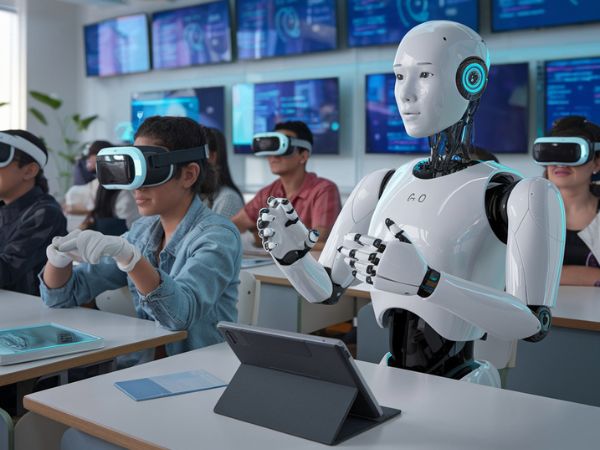Copyright © 2025 - TheBuzzFever
Artificial Intelligence is impacting various industries across the world including the education sector. With machine learning and data analytics becoming more advanced, the future of AI in education is expected to see many changes in learning and teaching. Let’s talk about some of these changes.
Redefining Learning Experiences
AI has also improved the struggle that traditional classrooms faced in providing personalized education to each student based on their individual needs. Modern AI tools can be used to track a student’s progress, identify the problems that he is facing, and make a learning path according to his needs. Steps like these ensure every student gets an equal understanding of a subject and identify and solve any problems that they face at an individual level.
The future of AI in education is yet to see more advancements in terms of customizations and the ability to make personalized learning more efficient. AI can even help provide better learning experiences to students having disabilities with tools like AI-powered voice-to-text applications and other such tools. This can make education more accessible even to disabled individuals.
Increasing Teacher Efficiency
The future of AI in education not only improves the learning experience of students, it also enhances the experience and efficiency of the teachers. AI-powered tools can help teachers automate tasks such as taking attendance, making progress reports, etc., which in return gives more time for teachers to focus more on mentoring the students.
For example, platforms like Knewton Alta use AI to track student performance based on several metrics that are pre-defined, helping teachers plan more personalized lesson plans for students. Another powerful tool is Turnitin which uses AI to make assessments more secure using advanced algorithms for proctoring and plagiarism detection.
The future of AI in education is also said to witness real-time suggestions being given to teachers during teaching sessions. The AI may get advanced enough to analyze the classroom and suggest teachers a better approach to teaching that particular topic if it finds students disengaged. This gives teachers insight into how to improve their strategies and increase the learning and productivity of the classroom.
Opening Doors for Global Educational Access
AI can play a major role in providing quality education to students across the world by breaking class barriers. Education can be democratized so that students coming from different socioeconomic backgrounds can benefit from it.
A lot of online learning platforms have started using AI to enhance student experience and to reach out to more students worldwide to provide them with quality education, track their progress, and give them feedback according to their performance. With advanced technologies involved in making these platforms, they are also able to provide their content in multiple languages thus breaking language barriers.
AI chatbots and tutors can also reduce the need for human teachers to be present all the time for support and assistance. This can be very beneficial in some remote or less privileged areas where there is a shortage of qualified teachers. This will create a system of equality in the field of education where every student will get the same quality education with the same support all thanks to these AI-powered tools.
Future of AI in Education and its Challenges
As good as the future of AI in education looks, it also comes with its challenges and concerns that should be addressed beforehand. One of the major concerns is data privacy, as all these AI-based tools require immense amounts of data to carry out their functions. So it is very important to ensure that student data is protected and securely stored and must be used only for educational purposes by the organizations.
Another challenge is to train the AI models to prevent biases. AI systems must be created free from biases based on any ideology or community so that students can be given unbiased learning that aligns with the truth.
Apart from all this, we can’t neglect human interaction and its role in education. The future of AI in education might look bright without any major human intervention but it still requires some amount of human touch to it. While AI can surpass human intelligence in problem-solving and other tasks it still lacks empathy and understanding that only a human can possess.
Conclusion
To sum up, we can say that the future of AI in education comes with its pros and cons. While AI can revolutionize the existing education system with its powerful tools that use machine learning and advanced algorithms to enhance the learning experience, it also raises concerns about data privacy and inequality arising from algorithms trained on biased data.
So, to harness the potential of AI in education while taking into account its limitations we need to create an ecosystem that has a blend of AI tools and humans to make the best out of both to provide education that is more efficient, and impactful.

